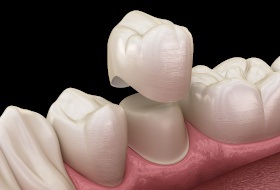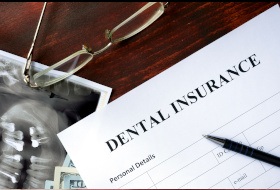Dental Crowns – Pittsburgh, PA
More Protection for Decayed & Damaged Teeth
Even if you brush and floss, your smile will still wear down over the years. This decline can lead to all sorts of tooth damage – cavities, chipped teeth, etc. – as time passes. Thankfully, none of these facts mean you must live with a decayed or worn-out grin; just get dental crowns here in Pittsburgh! Advanced Dental Solutions of Pittsburgh will use them to protect your weak teeth. You can learn more by reading below, or book a visit to see us soon.
What is a Dental Crown?

Dental crowns are restorations or “caps” that fit over damaged, weak, or decayed teeth. When one is placed, it keeps harmful bacteria away from the tooth and evenly distributes your bite force. Its other features depend on its materials, which can range from gold and cast metal to porcelain or resin.
Due to the facts above, the best dental crown candidates have one (or more) of the following:
- A tooth treated with root canal therapy
- An extensive fracture in a tooth
- Large fillings that are failing
- An existing but damaged crown
- A cosmetically imperfect tooth
- Bite problems that need correction
The Dental Crown Process

Normally, the dental crown process takes two dental visits. The first visit prepares the patient’s tooth for restoration, while the second one places the crown once it’s ready.
Our team follows various steps for the initial “prep” visit. Firstly, we’ll numb your mouth before treatment so our work doesn’t cause pain. We’ll then remove any old fillings or decay before rebuilding the missing structure with a “core buildup.” Next, our dentists will trim your tooth (to make room for the final dental crown) and make an impression of it. Lab workers will use the impression to make your crown in 2-3 weeks, so you’ll wear a temporary one in the meantime.
For the second visit, our team will place your final dental crown. This work should go smoothly – we just need to ensure the crown matches your teeth correctly. Once we’ve done so, we’ll cement the restoration and give it a final polish.
Of course, you can also skip this multi-visit process by getting a CEREC same-day crown. This kind relies on technology to fabricate a full porcelain crown in one dental appointment. That way, your tooth’s new cap can be made and placed on the same day!
The Benefits of Getting a Dental Crown

There are many benefits to getting a dental crown, including:
- A Gorgeous Grin – Many dental crowns use tooth-colored materials to blend seamlessly with your smile. That means your treatment results can look gorgeous and lifelike!
- Durable Protection – A dental crown protects your tooth from microbes and helps it endure your bite. This trait keeps you from needing a root canal or tooth extraction later.
- Versatile Care – Dental crowns can treat cavities, chips, cracks, and more, as they cover the whole tops of your teeth.
- Long-Lasting Results – A well-maintained dental crown can last 15 years or more.
Understanding the Cost of Dental Crowns

No matter why you’re getting your dental crowns, you’re probably wondering the same thing: what will I have to pay for them? You’ll be happy to learn that we do everything that we can to make sure that your treatment is as affordable as possible.
We’ll be sure to offer you a full estimate for what your care is going to cost when we meet you in person, but before then, here’s what you should know about the price of a dental crown.
Factors that Affect the Cost of Dental Crowns

The cost of dental crowns varies based on several factors:
- Material: Crowns can be made from porcelain, metal, or a combination. Porcelain is more expensive due to its natural look.
- Location: Costs differ depending on the region and dental office, influenced by local living expenses.
- Tooth Condition: If the tooth needs additional work, such as a root canal or buildup, it will increase the overall cost.
- Lab Fees: Custom crowns are made in a lab, and the complexity of the work affects pricing.
- Insurance Coverage: Your out-of-pocket cost will depend on what your insurance plan covers.
These factors combined determine the final price for a crown. We’ll review each of them in detail when we meet you in person.
Does Dental Insurance Cover Dental Crowns?

Dental insurance often covers a portion of the cost for dental crowns, but the extent of coverage varies by plan. Typically, insurance will cover crowns if they are deemed medically necessary, such as for restoring a broken or decayed tooth. Coverage may not be available if the crown is for purely cosmetic reasons.
It's always best to check with your insurance provider to understand your specific coverage, co-pays, and any limitations. We’ll be happy to help you through that process.
Other Options for Making Dental Crowns Affordable

We also know that not all of our patients have dental insurance, but we still want our patients to be able to afford the dental care that we offer them. For that reason, we offer alternatives that may make your restorations fit your budget better.
One option you might be interested in is financing, which can allow you to split the cost of your services across several months. We frequently work with CareCredit, which can allow you to pay off your care gradually with little-to-no additional interest.
If you want to learn more about how you can make your dental crowns affordable, feel free to reach out to us for an appointment today!
Dental Crown FAQs
What Are Dental Crowns Made Of?
Your dentist in Pittsburgh can make your crown out of a variety of materials, depending on your needs. Here’s a brief overview of what we offer:
- Gold crowns. Restorations made from metals like gold have been used for decades, and there’s a good reason for that! Though it won’t exactly blend in with your smile, a gold crown will be incredibly durable.
- All-porcelain. As a type of ceramic, porcelain can be customized to look impressively tooth-like. They tend to be on the pricier end of the spectrum, but can last for 15 years or more, and will appear completely seamless.
- All-resin. These types of crowns combine realistic aesthetics with affordability. Just note that they do tend to wear down much faster than all-porcelain or gold crowns.
How Do You Know When a Dental Crown Needs to Be Replaced?
No matter which type of material you choose for your dental crown, it might be time to get a replacement if:
- You experience pain. In this case, the tooth underneath your crown may have a cavity. We’ll have to remove your restoration, treat the cavity, then either reseat or replace your crown.
- Your crown feels loose. An unstable crown could fall out and leave the tooth underneath unprotected, so call us right away if it starts to wiggle!
- You’re no longer satisfied with the aesthetics. The appearance of your smile can be just as important as your dental health. If your crown looks stained, faded, chipped, cracked, or otherwise worn out, we’ll be happy to give you a fresh one.
Are Dental Crowns Safe for MRI?
Generally, crowns made from gold or other metallic materials are NOT safe for MRI. Since MRI’s rely on magnetic fields, the presence of metal can distort the images, making it nearly impossible for your doctor to provide an accurate diagnosis. There’s also a chance that the magnetic field could pull your gold crown right off!
All-ceramic and all-resin crowns, on the other hand, are considered safe for MRI. That said, you may still want to check in with the technician, just in case.
Do Dental Crowns Feel Natural?
Naturally! All puns aside, your crown will start to feel more and more natural as time goes on. Your dentist in Pittsburgh will take great care to craft your crown so that it fits perfectly over your damaged tooth, and the materials we offer are known for being quite comfortable. If your bite does feel a bit strange at first, don’t panic. It could seem off simply because you’re used to resting your teeth a certain way. But if the discomfort persists, definitely let us know so we can make any necessary adjustments.
What Happens If You Wait Too Long to Get a Dental Crown?
If your Pittsburgh dentist is recommending that you get a dental crown, it’s because you have a severely damaged tooth. Pearly whites with a compromised structure are more fragile and could shatter under pressure. They’re also more vulnerable to infection. Waiting too long to get a crown risks needing much more serious treatment later, such as a root canal or extraction. So be sure to take care of your tooth in a timely manner!
